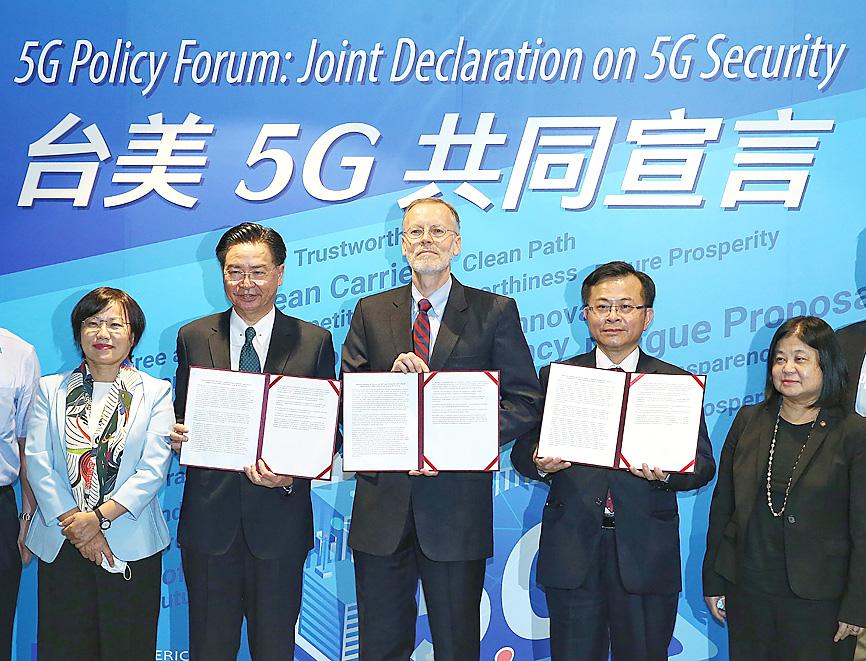The government has budgeted about NT$15.5 billion (US$548.5 million) to subsidize telecoms for the building of 5G base stations, with the aim of raising service coverage to 85 percent in two-and-a-half years, the National Communications Commission (NCC) said yesterday.
The program funding came from the budget for the third phase of the Forward-looking Infrastructure Development Program, in which the Executive Yuan earmarked NT$26.6 billion for a five-year plan to speed up the deployment of 5G infrastructure, the commission said.
However, in January, the Legislative Yuan only approved the budget for the first two years: NT$9.92 billion for this year and NT$5.57 billion for next year, it said.

Photo: CNA
Yesterday, the commission also approved the guidelines governing the distribution of subsidies between telecoms, which would help accelerate the installation of 5G base stations at public transport hubs, key industrial zones and non-profit institutions.
Commission Vice Chairman and spokesperson Wong Po-tsung (翁柏宗) said that the guidelines would ensure that subsides would be distributed fairly, transparently and easily, adding that there would be incentives for telecoms to compete with one another, to install more base stations quickly.
Based on the guidelines, the commission would only subsidize base stations that are in addition to the ones stated in telecoms’ business plans.
The more base stations telecoms build beyond their business plans, the more subsidies they would be granted, the commission said.
NCC data showed that five telecoms had pledged in their business plans to build a total of 25,150 5G base stations in five years.
After the announcement of government subsidies, telecoms now aim to build 56,500 5G base stations in five years, the commission said.
Telecoms applying for subsidies are required to prioritize installations of base stations in public places, as well as other strategic areas, the commission said, adding that 3 percent of the budget would be reserved for the development of vertical applications.
Each telecom would not receive subsidies of more than 50 percent of the total that it spends building 5G base stations, it said.
The commission said that the subsidy program would stimulate the upgrade of the information and communications technology sector by encouraging the companies to purchase domestically produced equipment, starting next year.
From 2023, telecoms seeking subsidies would need to have at least 40 percent of their equipment made in Taiwan, it said.

A group of Taiwanese-American and Tibetan-American students at Harvard University on Saturday disrupted Chinese Ambassador to the US Xie Feng’s (謝鋒) speech at the school, accusing him of being responsible for numerous human rights violations. Four students — two Taiwanese Americans and two from Tibet — held up banners inside a conference hall where Xie was delivering a speech at the opening ceremony of the Harvard Kennedy School China Conference 2024. In a video clip provided by the Coalition of Students Resisting the CCP (Chinese Communist Party), Taiwanese-American Cosette Wu (吳亭樺) and Tibetan-American Tsering Yangchen are seen holding banners that together read:

UNAWARE: Many people sit for long hours every day and eat unhealthy foods, putting them at greater risk of developing one of the ‘three highs,’ an expert said More than 30 percent of adults aged 40 or older who underwent a government-funded health exam were unaware they had at least one of the “three highs” — high blood pressure, high blood lipids or high blood sugar, the Health Promotion Administration (HPA) said yesterday. Among adults aged 40 or older who said they did not have any of the “three highs” before taking the health exam, more than 30 percent were found to have at least one of them, Adult Preventive Health Examination Service data from 2022 showed. People with long-term medical conditions such as hypertension or diabetes usually do not

POLICE INVESTIGATING: A man said he quit his job as a nurse at Taipei Tzu Chi Hospital as he had been ‘disgusted’ by the behavior of his colleagues A man yesterday morning wrote online that he had witnessed nurses taking photographs and touching anesthetized patients inappropriately in Taipei Tzu Chi Hospital’s operating theaters. The man surnamed Huang (黃) wrote on the Professional Technology Temple bulletin board that during his six-month stint as a nurse at the hospital, he had seen nurses taking pictures of patients, including of their private parts, after they were anesthetized. Some nurses had also touched patients inappropriately and children were among those photographed, he said. Huang said this “disgusted” him “so much” that “he felt the need to reveal these unethical acts in the operating theater

Heat advisories were in effect for nine administrative regions yesterday afternoon as warm southwesterly winds pushed temperatures above 38°C in parts of southern Taiwan, the Central Weather Administration (CWA) said. As of 3:30pm yesterday, Tainan’s Yujing District (玉井) had recorded the day’s highest temperature of 39.7°C, though the measurement will not be included in Taiwan’s official heat records since Yujing is an automatic rather than manually operated weather station, the CWA said. Highs recorded in other areas were 38.7°C in Kaohsiung’s Neimen District (內門), 38.2°C in Chiayi City and 38.1°C in Pingtung’s Sandimen Township (三地門), CWA data showed. The spell of scorching